ARCHIVE – BC & NATIONAL Breaking News [March 2017]
 Wednesday, March 29 ~ BC. A new, updated guide to freshwater fishing rules and regulations in BC was announced today by the Minister of Forests, Lands and Natural Resource Operations Steve Thomson.
Wednesday, March 29 ~ BC. A new, updated guide to freshwater fishing rules and regulations in BC was announced today by the Minister of Forests, Lands and Natural Resource Operations Steve Thomson.
The 2017-2019 Freshwater Fishing Regulations Synopsis has been posted on the BC government fishing regulation website and print copies will soon be available at Front Counter BC, Service BC and stores that sell fishing licences. Use this direct link to download the regulations for Vancouver Island .
This synopsis is a comprehensive guide to the regulations, policies, and practices that guide freshwater fishing in BC. The Province updates the synopsis every two years, and regularly posts updates online.
The synopsis also includes important angling-related articles including information on stopping the spread of invasive aquatic species, catch-and-release best practices, and tips on how to help keep aquatic ecosystems natural, intact and healthy.
Freshwater fishing generates almost $1 billion towards the provincial economy annually. The Province collects $10 million each year from licence fees, money which goes directly to the Freshwater Fisheries Society of BC. The Society supports angling-related research, conservation, stocking, access and education programs.
Under the federal Fisheries Act, the Province is responsible for non-salmon freshwater fisheries, including sea-run steelhead, trout, and char. The federal government is responsible for commercial and recreational fisheries in tidal waters, and salmon fisheries.
Find out more about the Freshwater Fisheries Society at: https://www.gofishbc.com
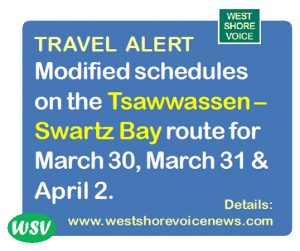 Tuesday, March 28 ~ BC SOUTH COAST. BC Ferries says one of their large vessels the Spirit of Vancouver Island remains out of service until approximately April 7. The large ship was first taken offline effective last Saturday, March 24.
Tuesday, March 28 ~ BC SOUTH COAST. BC Ferries says one of their large vessels the Spirit of Vancouver Island remains out of service until approximately April 7. The large ship was first taken offline effective last Saturday, March 24.
The Spirit of Vancouver Island which operates on BC Ferries’ Metro Vancouver – Victoria (Tsawwassen – Swartz Bay) route, remains out of service due to a hydraulic issue with the port side controllable pitch propeller. The vessel will dry dock on March 31 for approximately one week for repairs.
As a result of the mechanical issue, the following modified sailing schedule will be in effect for March 30, 31 and April 2:
| Thursday, March 30 | Friday, March 31 | Sunday, April 2 | |||
| From | From | From | From | From | From |
| Tsawwassen | Swartz Bay | Tsawwassen | Swartz Bay | Tsawwassen | Swartz Bay |
| 7 am | 7 am | 7 am | 7 am | 7 am | 7 am |
| 9 am | 9 am | 9 am | 9 am | 9 am | 9 am |
| 11 am | 11 am | 11 am | 11 am | 11 am | 11 am |
| 1 pm | 1 pm | 1 pm | 1 pm | 12 pm | 1 pm |
| 2 pm | 3 pm | 2 pm | 3 pm | 1 pm | 2 pm |
| 3 pm | 4 pm | 3 pm | 4 pm | 3 pm | 3 pm |
| 5 pm | 5 pm | 5 pm | 5 pm | 4 pm | 5 pm |
| 7 pm | 7 pm | 6 pm | 7 pm | 5 pm | 6 pm |
| 9 pm | 9 pm | 7 pm | 8 pm | 7 pm | 7 pm |
| – | – | 9 pm | 9 pm | 9 pm | 9 pm |
During the above dates, 11 of the 57 Tsawwassen – Swartz Bay sailings are cancelled. Customers with reservations on these sailings are being notified by BC Ferries’ Customer Care team and accommodated on the next available sailing.
There is the Nanaimo (Tsawwassen – Duke Point) route for customers who may wish to consider travelling that route as an alternative on Sunday, April 2:
- From Tsawwassen 5:15 am and 7:45 am
- From Duke Point 5:15 am and 7:45 am
Heavy traffic is expected on several sailings between Metro Vancouver and Vancouver Island this weekend. BC Ferries anticipates Thursday, Friday and Sunday afternoon and evening to be busy. In particular, late Sunday afternoon at Tsawwassen will be extremely busy. Customers may wish to consider travelling earlier from Tsawwassen to Swartz Bay on Sunday to avoid heavy traffic.
Customers travelling on the Tsawwassen – Swartz Bay route this weekend with a specific sailing time in mind may wish to make a reservation by calling 1-888-BCFERRY. Customers travelling on this route without reservations may wish to consider travelling via the Metro Vancouver – Nanaimo (Tsawwassen – Duke Point) or West Vancouver – Nanaimo (Horseshoe Bay – Departure Bay) routes.
Southern Gulf Islands Thru Fare. Customers are reminded there is another direct route to travel to the Southern Gulf Islands via the
Queen of Nanaimo. See www.bcferries.com for more info.
BC Ferries says they appreciate customers’ patience and will provide an update on the Spirit of Vancouver Island when more information is available.
 Tuesday, March 28 ~ WEST SIDE of VANCOUVER ISLAND. Funding to support a wider tsunami warning range on the west side of Vancouver Island has been announced today by Emergency Management BC (EMBC).
Tuesday, March 28 ~ WEST SIDE of VANCOUVER ISLAND. Funding to support a wider tsunami warning range on the west side of Vancouver Island has been announced today by Emergency Management BC (EMBC).
Residents of Port Renfrew and the Pacheedaht First Nation will receive increased capability for tsunami warnings and the potential to provide earthquake early warnings, thanks to a $550,000 contribution from the BC Disaster Mitigation Program to the Capital Regional District (CRD), it was announced today March 28.
The funds will replace existing obsolete tsunami sirens with new warning technology to help residents to be quickly informed in the event a tsunami threatens the region. The tsunami siren upgrades will include voiceover capability and remote activation, expanding the audible warning zone to include the Pacheedaht First Nation community. The proposed system will have the potential to provide early warning prior to an earthquake actually occurring. This could allow residents time to drop, cover and hold on, and head to high ground.
The funding is all a part of a broader set of more than $80 million invested in emergency preparedness and mitigation. Some of these investments, which will have positive benefits throughout the province, include:
- $32 million to the Community Emergency Preparedness Fund to be administered by UBCM that will include items like $3 million for flood risk assessments, floodplain maps and flood mitigation plans, $20 million to fund flood mitigation projects, and $4.2 million emergency social services.
- $5.5 million for the BC Search and Rescue Association for essential supports to search and rescue (SAR) volunteers, the SAR prevention program AdventureSmart, the acquisition, maintenance and upgrading of rescue equipment, and deployable communication systems to assist in communication in BCs backcountry.
- $500,000 to Avalanche Canada to support public education and avalanche alert throughout BC.
- $100,000 to PEP Air to support capital purchases and recognize the effort of the volunteer air search and rescue teams throughout the province.
![Mike Hicks, Director, Juan de Fuca Electoral Area [Photo 2017: West Shore Voice News]](https://islandsocialtrends.ca/wp-content/uploads/2016/09/3085-Hicks-headshot2-Mar2317-1in.jpg)
Mike Hicks, Director, Juan de Fuca Electoral Area [Photo 2017: West Shore Voice News]
“͞This investment will provide a much needed replacement of the current tsunami warning system. It will be critical to the safety of the residents and visitors to Port Renfrew and the Pacheedaht First Nation,”‘ says Mike Hicks, director, Juan de Fuca Electoral Area. “This new world-class, state-of-the-art warning system will help to protect the community from the very real threat of tsunamis.”
“The over $80 million in investments in community emergency preparedness will help us better withstand floods, fires, or earthquakes that could impact our province. Emergency preparedness is a shared responsibility that begins in every home, in every business and across all levels of government. This funding is another of many provincial investments and initiatives to help keep British Columbians safe,” said Naomi Yamamoto, Minister of State for Emergency Preparedness.
“͞The threat of earthquakes and a resulting tsunami is part of Pacheedaht community life,” says Chief Jeff Jones, Pacheedaht Nation. “It is not a matter of if, but when the event will occur; this has been a part of Pacheedaht͛’s history since time immemorial. We are grateful for the upgrades to the tsunami warning system, and hope this builds momentum for other emergency preparedness initiatives in Pacheedaht traditional territory.”

BC Education Minister Mike Bernier
Saturday, March 25 ~ BC. MORE MONEY TO HIRE BC TEACHERS. Working with “language that was 15 years old”, the BC Ministry of Education and BC Teachers Federation (BCTF) negotiated for several months to get the numbers right. “We tried to build in some flexibility for employers,” said BC Education Minister Mike Bernier in a news conference on March 24.
With now $330 million more per year (i.e. $150 newly announced plus $100 already announced and $80 million from the Learning Improvement Fund), there’s now more money to every BC school district to hire more teachers — about 2,600 in total. School districts will in total also receive $30 million each year for “soft costs” like additional classroom supplies and CUPE janitorial services that go along with having more classrooms in active use.
The ‘old language’ was from an agreement that was overturned by the BC Government in 2002, only to be reinstated in November 2016 by the Supreme Court of Canada. Clauses that had been stripped out of the contract covered class size and composition.
Classes grew larger over the years, the number of special needs students (who usually require more attention) increased, and technologies have changed. Funding to education budgets did not always allow for enough educational assistants to help out with increased load on the teachers. School libraries eventually closed or were staffed minimally by teachers for specific class visits. The number of counsellors per school was considered low, based on the need of increasing mental health demand. Budgets for supplies and classroom equipment became squeezed by teaching salaries demand on overall school board budgets. As a result, a few generations of students have gone through the BC school system not even knowing what they missed.
Bernier said $1.7 billion is now in the BC budget over three years for K-12. There are about 65,000 fewer students in BC (compared to 2002). Bernier said the drop in student numbers was 75,000 two years ago, but that enrollments have been increasing again in the last two years.
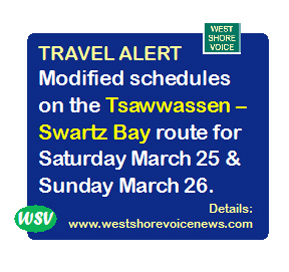 Friday, March 24 ~ VANCOUVER ISLAND SOUTH COAST & MAINLAND. BC Ferries has advised has the Spirit of Vancouver Island vessel has been temporarily removed from service with modified schedules on the Tsawwassen – Swartz Bay <Vancouver-Victoria> route for Saturday March 25 and Sunday March 26.
Friday, March 24 ~ VANCOUVER ISLAND SOUTH COAST & MAINLAND. BC Ferries has advised has the Spirit of Vancouver Island vessel has been temporarily removed from service with modified schedules on the Tsawwassen – Swartz Bay <Vancouver-Victoria> route for Saturday March 25 and Sunday March 26.
The interruption is due to a hydraulic issue with the port side controllable pitch propeller. Engineers continue to troubleshoot the issue and will determine early next week the further status of the vessel. This removal from service means only three vessels are available
to operate on the route on Sunday as opposed to four. There is no change in number of vessels operating the route on Saturday.
Heavy traffic is expected on some sailings between the Lower Mainland and Vancouver Island this weekend. BC Ferries advises customers travelling on the Tsawwassen – Swartz Bay route this weekend with a set travel time in mind to make a reservation by calling 1-888-BCFERRY. Customers travelling on this route without reservations are advised to consider travelling via the Tsawwassen – Duke Point or Horseshoe Bay – Departure Bay routes.
As a result of the mechanical issue, the following sailings have been cancelled on the Tsawwassen – Swartz Bay route:
- Saturday, March 25 – From Tsawwassen 2 pm | From Swartz Bay 12 noon
- Sunday, March 26 – From Tsawwassen 12 noon & 4 pm | From Swartz Bay 2 pm & 6pm
- Customers with reservations on the sailings above are being notified by BC Ferries’ Customer Care team and accommodated on the next scheduled sailing.
To assist customers travelling between the Lower Mainland and Vancouver Island and due to the reduced capacity, the Queen of New Westminster will perform additional sailings on the Tsawwassen – Swartz Bay route as follows:
- Saturday, March 25 – From Tsawwassen 12 noon & 4 pm | From Swartz Bay 2 pm & 6 pm
- Sunday, March 26 – From Tsawwassen 10 am | From Swartz Bay 8 pm & 11 pm* (* by Coastal Rennaissance)
There are additional sailings on the Tsawwassen-Duke Point route:
- Sunday, March 26 – From Tsawwassen 5:15 am & 7:45 am | From Duke Point 5:15 am & 7:45 am
BC Ferries says they appreciate customers’ patience and will provide an update when more information about the status of the Spirit of Vancouver Island is available.
 Thursday, March 23 ~ BC. Most people are pretty good at conserving electricity nowadays, so Earth Hour doesn’t have the same megawatt-punch as it did when the one-hour worldwide event started in 2007, as most people actively conserve electricity nowadays.
Thursday, March 23 ~ BC. Most people are pretty good at conserving electricity nowadays, so Earth Hour doesn’t have the same megawatt-punch as it did when the one-hour worldwide event started in 2007, as most people actively conserve electricity nowadays.
In fact, the BC Government now sees it as a symbolic gesture: “While the one hour without lights is intended to be a symbolic act encouraging people to consider conservation throughout the year, the collective impact of this global action is significant. I encourage everyone to participate,” says Mary Polak, Environment Minister.
So here we go again — this Saturday night March 25, there will be Earth Hour 2017 activity between 8:30 pm and 9:30 pm (local time) around the world. People are encouraged to reduce their electricity usage as much as possible during that evening hour, particularly ‘lights out’ so as to make a visual impact.
The BC government says it will be demonstrating its on-going support for climate action by joining the worldwide grassroots movement, most noticeably by turning off the Jubilee Lights at the Parliament Buildings in Victoria and the Lions Gate Bridge lights in Vancouver to celebrate the 11th-annual Earth Hour. Where possible, more than 170 provincial government offices will power off non-essential lights and electronics.
Earth Hour is a global event in support of climate change action. Participants from six continents, over 170 countries and 24 time zones will be united as a global community through individual action.
The global event started in Sydney, Australia in 2007 by the World Wildlife Fund to raise awareness about the effects of climate change. Earth Hour has grown to engage more than 7,000 cities worldwide and continues to be recognized as a leader in uniting people all over the globe to combat climate change.
According to the World Wildlife Fund, Earth Hour is scheduled for 8:30 p.m. to 9:30 p.m because it is the closest hour to sunset in both hemispheres, allowing for the biggest visual impact of lights out everywhere. Last year Earth Hour 2016 took place in more than 7,000 cities, in more than 24 time zones.
After Earth Hour, BC Hydro usually publishes the percentage reductions in electricity use for each town and city in the province.
Wednesday, March 22 ~ OTTAWA/National. Today Finance Minister Bill Morneau delivered their 2017 Budget in the House of Commons today. It’s the second budget delivered by the Trudeau Liberal government.
Last year’s budget in February 2016 focussed on large investments in infrastructure and programs to support the middle class. This year’s budget on March 22 aims to support the technology/innovation job market (through education and retraining during affected-worker unemployment) and provides more social benefits like longer maternity leave.
The budget revises the deficit for the year just ended, rising slightly to $23 billion, and forecasts a deficit for the coming year of $28.5 billion, including a $3-billion “risk adjustment”.
Here are highlights from the 2017 federal budget (as summarized by the CBC):
• Deficit: $28.5 billion, up from $25.4 billion projected in the fall.
• Trend: Higher deficits for next three years before dipping to $18.8 billion in 2021-2022.
• Housing: $11.2 billion over 11 years, already budgeted, will go to a national housing strategy.
• Child care: $7 billion over 10 years, already budgeted, for new spaces, starting 2018-2019.
• Indigenous: $3.4 billion in new money over five years for infrastructure, health and education.
• Defence: $8.4 billion in capital spending for equipment pushed forward to 2035.
• Caregivers: New care-giving benefit up to 15 weeks, starting next year.
• Skills: New agency to research and measure skills development, starting 2018-2019.
• Innovation: $950 million over five years to support business-led “superclusters”.
• Startups: $400 million over three years for a new venture capital catalyst initiative.
• Families: Option to extend parental leave up to 18 months [added note: no additional funds; available monies spread over 18 months instead of 12].
• Uber tax: GST to be collected on ride-sharing services.
• ‘Sin’ taxes: One cent more on a bottle of wine, five cents on 24 case of beer.
• No more Canada Savings Bonds.
• Transit credit killed: 15% public transit tax credit phased out this year.
The National Post has summarized the five top highlights as follows:
- Canada Savings Bonds will no longer be available.
- Get used to deficits. They’ll be on the books until at least 2020.
- $7 billion for more affordable childcare plus longer mat leave
- $11 billion for a national housing strategy
- Higher taxes for alcohol which will be tied to the rate of inflation.
 SPRING 2017 WEST SHORE VOICE NEWS READERSHIP SURVEY ~ March 22, 2017.
SPRING 2017 WEST SHORE VOICE NEWS READERSHIP SURVEY ~ March 22, 2017.
We invite all West Shore Voice News readers to take part in a 3-minute survey about reading our publication (print / online).
Your input will be anonymous, but only one set of responses per IP address will be accepted.
We appreciate your input. We are always striving to reach and serve our many readers in the best ways possible — technology, content, and marketing support.
Here’s the survey link. Responses will be accepted up to April 5, 2017. Thank you!
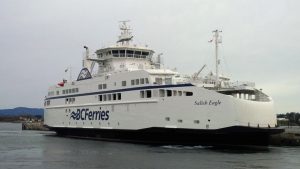
The Salish Eagle will service the Tsawwassen – Southern Gulf Islands route.
Monday, March 20 ~ VICTORIA. The newest vessel in the BC Ferries fleet — Salish Eagle — is arriving in BC today. The vessel took 38 days to travel 10,440 nautical miles from Remontowa Shipbuilding S.A. in Gdansk, Poland.
This ship will make its way to Ogden Point in Victoria, where the public can take exterior photos of the vessel today. Once Salish Eagle clears Canadian Customs and final inspections are complete, the vessel will be officially handed over to BC Ferries. On Tuesday, March 21, the ship will proceed to BC Ferries’ refit facility in Richmond to prepare for operational service. The vessel will move to Tsawwassen terminal in mid-April for crew training and familiarization, and to continue to ready the ship for regular operation.
“We are proud to welcome Salish Eagle, our second natural gas-fuelled ship, home to BC and into our fleet,” said Mark Wilson, BC Ferries’ Vice President of Engineering. “The Salish Class are well-built vessels that will help reduce our environmental footprint and our operating costs.”
The artwork created to adorn Salish Eagle, designed by Stz’uminus First Nation’s John Marston, will be applied on the ship here in BC. The winter weather in Poland has temperatures below ideal for the application.
Salish Eagle will enter service on the Tsawwassen – Southern Gulf Islands route at the end of June. Her sister ship, the Salish Orca, will start service on the Comox – Powell River route late next month. Salish Raven, the third Salish Class vessel, will depart Poland for BC in April.
The 107-metre Salish Class ships will carry 145 vehicles and up to 600 passengers and crew. The vessels feature two car decks and have a service speed of 15.5 knots. Each ship is powered by three Wartsila 8L20DF engines. Gross tonnage of each ship is 8,728 tonnes.
 Friday, March 17, 2017 ~ VANCOUVER ISLAND. BC Ferries rates for commercial vehicles that are 13 feet wide (or wider) will more than double on April 1, 2017 from $6.50/ft to $13.24/ft, to reflect that they take up two lanes, said BC Ferries in a news release March 16.
Friday, March 17, 2017 ~ VANCOUVER ISLAND. BC Ferries rates for commercial vehicles that are 13 feet wide (or wider) will more than double on April 1, 2017 from $6.50/ft to $13.24/ft, to reflect that they take up two lanes, said BC Ferries in a news release March 16.
Probably in short order, this increase in shipping overhead will spill over into higher costs of consumer goods that are being transported by truck to Vancouver Island. It will also impact the cost of shipping raw products from the island.
It’s yet another way that the cost of living on Vancouver Island is expensive in unique ways compared to other parts of BC and Canada.
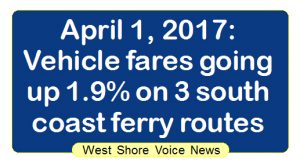 Thursday, March 16 ~ BC. Vehicle fares are going up on the Tsawwassen-Swartz Bay, Tsawwassen-Duke Point, and Horsehoe Bay-Departure Bay routes on BC Ferries sailings by 1.9% on April 1, 2017 — that’s up to $55.80 (from $54.80) for vehicles up to 20ft in length. There will be no increase in passenger fares on these routes. The current adult passenger fare on these routes is unchanged at $16.70 per person.
Thursday, March 16 ~ BC. Vehicle fares are going up on the Tsawwassen-Swartz Bay, Tsawwassen-Duke Point, and Horsehoe Bay-Departure Bay routes on BC Ferries sailings by 1.9% on April 1, 2017 — that’s up to $55.80 (from $54.80) for vehicles up to 20ft in length. There will be no increase in passenger fares on these routes. The current adult passenger fare on these routes is unchanged at $16.70 per person.
Effective April 1 there will also a $5 reduction in reservation fees (from $15 to $10) if you book seven days in advance on reservable routes. Reservations made less than seven days and up to one day prior will decrease to $17 (from $18.50). Reservations booked day of travel will go down to $21 (from $22).
Rates for commercial vehicles that are 13 feet wide (or wider) will increase from $6.50/ft to $13.24/ft, to reflect that they take up two lanes. In time, this increase will likely spill over into higher costs of goods that are being shipped by truck to the island.
Cancellation fees on northern routes will double, to discourage customers from booking space they don’t need, and to allow more customers access to the vehicle deck space.
BC Ferries says the increases are necessary to cover operating costs and major capital replacement projects. The company needs to replace one ship per year on average in order to maintain safe, efficient and reliable service, it was stated in a BC Ferries news release today.
![BC NDP Leader John Horgan at his local campaign launch in Langford, as the candidate for Langford-Juan de Fuca [Photo Copyright 2017 West Shore Voice News]](https://islandsocialtrends.ca/wp-content/uploads/2016/09/2636-JohnHorgan-CampaignLaunchLangfordJdF-Mar1117-WestShoreVOICENews-web-300x208.jpg)
BC NDP Leader John Horgan at his local campaign launch in Langford, as the candidate for Langford-Juan de Fuca [Photo Copyright 2017 West Shore Voice News]
Saturday, March 11 ~ LANGFORD. BC NDP Leader John Horgan held his local Langford-Juan de Fuca campaign launch today, Saturday March 11, at the Langford Legion.
Over 400 people were there for the event including long-time supporters from throughout the riding, several MLAs (including Melanie Mark and Jodie Wickens who came over from the mainland), two local NDP MPs (Randall Garrison and Alistair MacGregor), some local municipal leaders, many campaign workers and some media.
Horgan cut into Christy Clark’s BC Liberals and chastised the current government for the hardship imposed on regular working British Columbians. Horgan urged teachers, health-care workers and seniors not to forget how the last 15 years in BC have been hard on them and most British Columbians who are not “wealthy or well-connected”.
Horgan promised to work on bringing in a $15 minimum wage if the NDP is elected to government, as one way to offer a bit of a break to struggling workers. He resurrected remembrance of the ground-breaking work of 1970s NDP premier Dave Barrett for having started ICBC as an affordable auto insurance entity, not as it is used today as a ‘cash cow’, said Horgan.
First Nations elder Shirley Alphonse gave her absolute support to “her friend Horgan”, as part of her opening blessing.
The upbeat event included Horgan’s 30-minute speech as well as remarks from NDP finance spokesperson Carole James and education spokesperson MLA Rob Fleming, along with NDP candidate for Esquimalt-Metchosin Mitzi Dean.
Horgan was invited to the podium by his nominator, SD62 School Board Trustee Ravi Parmar.
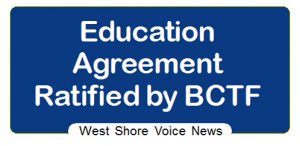 Saturday, March 11 ~ BC. Members of the BC Teachers Federation (BCTF) have voted 98.4% in favour to ratify an agreement that serves to restore collective agreement language in their collective agreement with the BC Government.
Saturday, March 11 ~ BC. Members of the BC Teachers Federation (BCTF) have voted 98.4% in favour to ratify an agreement that serves to restore collective agreement language in their collective agreement with the BC Government.
This comes 15 years after clauses that guaranteed class size and composition were ripped from the collective agreement by the BC Liberal government in 2002 under then Education Minister Christy Clark, and following a recent Supreme Court of Canada ruling that the contract changes were unconstitutional.
Not only teachers — but parents and most importantly, students — bore the painful and loss-filled scenarios that accumulated over the past 15 years under these conditions.
A few generations of youth have graduated from high school in BC not even realizing what they missed. The challenges for young adults to fit into the current workforce — and perhaps even the stresses made evident through rising levels of mental health issues — can in part be traced back to the systematic crumbling of the education system in BC.
Here is the BC Government’s statement from Education Minister Mike Bernier on the BCTF vote results on implementation of restored language. released to media on the evening of March 10, 2017:
- “I am very pleased that teachers have ratified the agreement because working together for student achievement is at the core of ensuring British Columbians can benefit from a strong, growing and diverse economy. The parties had to deal with some very complex issues. The challenge was how to restore nearly 1,400 old clauses across 60 different collective agreements within the context of an education system that evolved dramatically over the past 15 years.
- “We have a system today that has far more choice and flexibility for students and parents. There is more diversity in programs and courses. We have a system that is more inclusive of individual student needs. Student outcomes are up across the board and are amongst the best in the world. And we’ve seen dramatically improved outcomes for students with special needs and First Nations students.
- “So a key objective was to protect equitable access to learning and build on the significant gains that students have enjoyed. The parties agreed to make the old language work to the extent we can and to continue the dialogue until the next round of bargaining where we can pursue longer-term solutions.
- “Teachers will see reduced workloads and will be welcoming thousands of new colleagues into the system over the coming months. And students will benefit from knowing that they have access to the same learning opportunities as before.
- “I want to thank the parties for the significant effort and professionalism that was brought to the table. I hope we can build on this constructive approach. Government and the BCTF are working collaboratively on files, such as the new curriculum and Aboriginal education. If we continue in a spirit of collaboration, I am confident we can deliver even better results for our students in the years ahead.”
Here is the BCTF statement from their website on the evening of March 10, 2017 (member voting took place March 8-10… see March 4 article lower down on this page):
- With 21,156 BC Teachers’ Federation members participating, 98.4% voted in favour of ratifying the agreement to implement their restored collective agreement language. The agreement will see all the substantive working conditions that were unconstitutionally stripped from teachers’ collective agreements restored.
- “With this vote, BC schools are finally on the verge of having better working and learning conditions back in place,” said BCTF President Glen Hansman. “With our restored language in effect, BC schools, students, and teachers will see significant improvements in class sizes, support levels for children with special needs, and access to specialist teachers this September.
- The unconstitutional stripping of our collective agreement never should have happened in the first place, and a whole generation of students have gone without the frontline service they ought to have had during the entirety of their K-12 experience, but we are proud that we’re able to turn our Supreme Court of Canada victory into positive change so quickly. We can never forget, though, what happened.
- I want to thank all of our BCTF members for their tenacity and solidarity over the last 15 years. By sticking together and acting as outspoken advocates for our rights and our students’ education, we are finally going to see meaningful improvements in our schools. Thank you as well to parents who have supported us all these years.”
- Hansman said the focus will now shift to the collective agreement-based school staffing processes that will begin later this month as well as holding the government accountable for its commitment to fully fund all the costs.
- “The government stated it will fully fund the costs of implementing this agreement,” said Hansman. “All eyes will be on the BC Liberal government this March and April to ensure the necessary funds materialize. It’s also important to note that our restored language does not solve many of the other urgent funding pressures facing school districts. The government needs to step up and properly address overcrowding in many of our districts, the lack of resources for the revised curriculum, and all of the seismically unsafe schools across the province.”
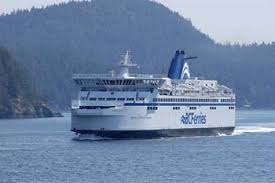 Friday, March 10 ~ VICTORIA – The regular passenger fare will be half price fleet-wide on over 2,000 BC Ferries sailings during March 11 to 30. Youth age 11 and younger will travel free during that promotion period.
Friday, March 10 ~ VICTORIA – The regular passenger fare will be half price fleet-wide on over 2,000 BC Ferries sailings during March 11 to 30. Youth age 11 and younger will travel free during that promotion period.
The 50%-off promotional discount is applicable on regular passenger fares for adult, BC senior, student and persons with disabilities. The complimentary travel for children 11 and under is applicable on a child’s fare.
On the Tsawwassen-SwartzBay route that means an adult will travel on available sailings for $8.60 and seniors for $4.30.
- South Coast Routes: the promotion will be in effect Monday through Thursday, Saturdays and Sundays on select sailings March 11 – 30.
- North Coast Routes including Port Hardy – Prince Rupert, Prince Rupert – Haida Gwaii and Alliford Bay – Skidegate routes as well as the Discovery Coast Connector: the 50% discount and kids-travel-free applies on every sailing March 11 – 30.
Experience™ Card users who receive a year-round discount that is less than 50% will have their discount increased to match the promotional fare. “This promotion allows those customers who do not participate in the Experience™ Card program an opportunity to travel at a discounted rate,” says BC Ferries.
Space on the select promotional sailings is on a first-come, first-served basis. Reservations are recommended. The discount is also available on select BC Ferries Vacations packages for customers looking for a Spring Break getaway. www.bcferries.com
Thursday, March 9 ~ GREATER VICTORIA AREA. The government of BC is going to review options for commuter train services in the Capital Regional District (CRD). As announced this morning, the Ministry of Transportation and Infrastructure will look at options around using the E&N rail line for transit services between Langford and Victoria West. This move is based on support from communities across the CRD, including Langford, Victoria, Esquimalt and View Royal.
“There has been strong community support for establishing a commuter service from the West Shore,” said Minister of Transportation and Infrastructure Todd Stone. “Previous referendums held in Langford and Colwood showed more than 90% of residents were in favour of the idea. We’re listening to what residents are telling us, and we are excited about the possibilities and want to engage further with the local governments as we work to turn this concept into reality.
“As with any major initiative, the first step is to ensure that this idea meets the criteria for safety, sustainability and affordability, and that it makes good business sense before moving forward,” said Minister Stone.
The proposal to use a portion of the E&N line for transit service on the 15-km stretch between Westhills in Langford and Vic West has been endorsed by the four communities. The proposal centres on how quickly the population is growing in the region and how the population growth is continuing to cause congestion along Highway 1 into Victoria.
“The province is aware that Langford, Sooke and the western communities have been growing quickly and are projected to continue to grow significantly,” Stone said.
The E&N rail line is owned by the Island Corridor Foundation, which has been working for several years to resume passenger rail service.
Victoria council endorsed a motion in the fall of 2016 to look at the viability of a commuter train on the line. Langford has been notably vocal about the need for commuter rail, as that city has continued to grow rapidly.
“If feasible, transit service along the E&N corridor from the West Shore would complement the investments we’re making in transit infrastructure in Greater Victoria, including a $10 million extension to the Douglas Street northbound bus lane, from Tolmie Avenue to the McKenzie interchange project, and the investment in the McKenzie interchange project itself, to address traffic congestion in the region,” added Stone.
A working group, including representatives from the ministry, local government, BC Transit, the Victoria Regional Transit Commission (VRTC) and BC Safety Authority, will be established to provide input on a corridor analysis the ministry will be undertaking, which will look at the options and potential opportunities for this part of the E&N rail corridor. The analysis is anticipated to be completed by the summer of 2017. As with all transit services in the region, any new service would be seamlessly integrated within the BC Transit system in Greater Victoria and overseen by VRTC.
“We look forward to participating in the study to examine transit opportunities on the corridor,” said BC Transit president and CEO Manuel Achadinha.
“New transportation options are critically important for the economy and social well-being of our growing region,” said Victoria Mayor Lisa Helps. “It makes good sense to explore the potential of using the E&N rail line for moving people between the Westshore and downtown.”
“I thank the Province for taking on this initiative,” said View Royal Mayor David Screech. “I believe the use of the E&N corridor is essential in the transportation planning for this region.”
“I would like to acknowledge all the assistance the Province has provided to Langford in constructing the numerous infrastructure projects undertaken in our growing community,” said Langford Mayor Stew Young. “We welcome the Province’s active involvement in the E&N Commuter Rail project to ensure a currently inactive corridor can be used to provide a vital link between Victoria and the vibrant community of Langford.”
Langford as a growing community is the most significantly impacted by congested commuter traffic. Mayor Young has pushed for opening up the E&N as an active train line for several years now.
“There has been concerted effort over a number of years to get this corridor seriously looked at; we are closer than ever now with the support of the Province,” said Township of Esquimalt Mayor Barb Desjardins. “The need for another corridor is illustrated every day when unfortunate incidents restrict traffic flow. Thanks to the Province for moving forward on this significant opportunity for improved transit in the region.”
The E&N rail line is owned by the Island Corridor Foundation, which has been working for several years to resume passenger rail service on the line. The foundation has expressed its support for the commuter train service proposal between Vic West and Langford.
The main slate for the key riding of Langford-Juan de Fuca (which now includes Langford, Sooke and Juan de Fuca up to Port Renfrew — but no longer Metchosin) includes three candidates. BC NDP Leader John Horgan has built and held a stronghold in the riding since 2005.
- Long-time MLA John Horgan is the BC NDP incumbent candidate for Langford-Juan de Fuca. Horgan is holding his local campaign launch this weekend on Saturday, March 11 in Langford (Langford Legion, 761 Station Ave, from 10:30 am to 12:30 pm). As party leader, he will be travelling all over BC during the campaign toward the May 9 election.
- The BC Liberals are running Cathy Noel as their candidate in Langford-Juan de Fuca. Noel has a broad reach in the sport-fitness community.
- The BC Green candidate for Langford-Juan de Fuca is Brendan Ralfs, a provincial emergency manager on southern Vancouver Island.
Another electoral area on the west side of South Vancouver Island long held by the NDP is Esquimalt-Metchosin (which includes Colwood). The current NDP MLA Maurine Karagianis is retiring from politics.
- The BC NDP candidate is Mitzi Dean, a long-time advocate for well-funded social services through the Pacific Centre Family Services based in Colwood.
- The BC Liberal candidate is Barb Desjardins, who is presently serving as both Mayor of Esquimalt and Chair of the Capital Regional District (CRD) board.
- The BC Greens today announced Dr Andy MacKinnon as their candidate for Esquimalt-Metchosin. He is a Professional Forester and Professional Biologist in BC, and author of books about plants of western North America.
Premier Christy Clark responds to bomb threat hoax which targeted the Vancouver Jewish Centre on March 7. [News 1130 photo]
Wednesday, March 8. BC Premier Christy Clark issued a statement today regarding a bomb threat in Vancouver last night, which turned out to be a hoax. The targeted building was the Vancouver Jewish Centre at West 41st Avenue and Oak Street.
“Last night, the Jewish Community Centre of Greater Vancouver (JCC) was evacuated after receiving a bomb threat. The threat turned out to be a hoax, but the fear caused by acts of anti-Semitism and threats like this at Jewish community sites across Canada and the United States is very real.
“We cannot allow hatred to become routine. We will only stop hatred by calling it out, condemning it – and continuing to lead by example, as a thriving, vibrant example that diversity leads to strength, not weakness.
“British Columbia is, and must continue to be, a welcoming, safe home to peoples of all faiths and ethnicities. There is no better example of this than the JCC, where people of many cultures come together and are welcomed. We will not be divided, and we will not change the values that define us.”
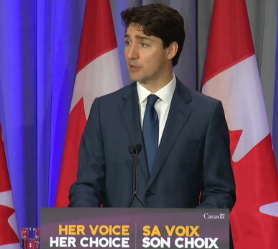
Prime Minister Justin Trudeau on International Women’s Day 2017
Wednesday, March 8. Today on International Women’s Day, Prime Minister Justin Trudeau announced $650 million in sexual and reproductive health programs for women overseas, over a period of three years.
This is doubling Canada’s current investment, helping to shore up the shortfall that resulted from the withdrawal of the USA from funding any international NGOs that support or counsel on abortion (as resulted from an executive order by US President Donald Trump in January). The United Nations recently had to find $850 million to make up the shortfall that resulted from the US pulling out, so today we see Canada doing its part.
“Like men, women should be able to choose, when they want to start a family, how big that family should be, and who they want to start that family with,” said Trudeau in Ottawa this morning. “Women and girls around the world are counting on countries like Canada to lead the way,” he said in support of the funding. “Equality matters. Today we’re taking steps to prove it,” said Trudeau, as a self-affirming feminist.
An official statement from the Prime Minister’s office was also released today on International Women’s Day.:
“Today, we join people all over the globe to celebrate the remarkable achievements that women have made everywhere, and reaffirm our commitment to gender equality worldwide.
“This year, Canada’s theme for International Women’s Day is #EqualityMatters, which reminds us that society is better – more prosperous, peaceful, secure, and cohesive – when women’s rights are respected, when women are valued and empowered, and when they lead the way in our communities.
“While we have taken significant steps toward gender equality, we know that much more work needs to be done. Women around the world continue to receive lower pay and fewer promotions. They are denied legal control over their bodies and reproductive health. They face much higher rates of harassment and verbal, physical, and sexual abuse. In impoverished communities, women are the least likely to have access to healthcare, the last ones to eat, and the most vulnerable to the hardships brought on by disease.
“That is why we will continue to place gender equality and rights, and the empowerment of women and girls, at the heart of our international development work. These efforts received a considerable boost this morning with the announcement that Canada will provide $650 million in funding to address gaps in sexual and reproductive health and rights in the world’s poorest and most vulnerable communities.
“Today, I remind Canadians that we all have a role to play in the fight for gender equality, and that we all benefit from a more gender equal world. Women and men, girls and boys, we must all step up and speak out, because half of the population cannot solve a problem that affects us all.
“On behalf of the Government of Canada, Sophie and I encourage all Canadians to join us in celebrating International Women’s Day, as we renew our commitment to a more positive, just, and equal world.”

The Government of Canada’s 2017 campaign for International Women’s Day makes use of stylized graphics, without photography or one main thematic logo.
Wednesday, March 8. Today March 8 is International Women’s Day.
This year the International Women’s Day theme put out there by the International Women’s Day website www.internationalwomensday.com is #BeBoldforChange — calling for “help in forging a better working world – a more inclusive, gender equal world”.
Canada’s Status of Women page at www.swc-cfc.gc.ca is promoting International Women’s Day as a day to recognize women’s achievements and acknowledge the challenges they continue to face in the quest for gender equality. A curious choice of 1950s-style comic-book graphics has been chosen to support this year’s campaign. In one graphic the caption reads: “Women in science, yes please” which sounds at the same time bold and submissive. The government is promoting the hashtag #EqualityMatters .
Announced on March 6 by Maryam Monsef, Minister of Status of Women, the Planned Parenthood branch in Ottawa is receiving $285,000 for a three-year project to improve services for women in the Ottawa area who have experienced violence related to sexual and reproductive coercion. No national campaign of a similar nature was launched.
The Government of Canada says it is taking a multifaceted approach to reduce and prevent violence against women and girls. This includes the development of a Federal Strategy to Address Gender-based Violence. “Reproductive and sexual coercion involves behavior intended to maintain power and control in a relationship. This includes but is not limited to behaviors such as: explicit attempts to impregnate a partner against her will, coercing a partner into unprotected sex, interfering with contraceptive methods, imposing unhealthy sexual practices, or controlling the outcome of a pregnancy.”
The United Nations 2017 theme for International Women’s Day is “Women in the Changing World of Work: Planet 50-50”, saying International Women’s Day is a time to reflect on progress made, to call for change and to celebrate acts of courage and determination by ordinary women who have played an extraordinary role in the history of their countries and communities. “The idea of this theme is to consider how to accelerate the 2030 Agenda, building momentum for the effective implementation of the new Sustainable Development Goals, especially goal number 5: Achieve gender equality and empower all women and girls; and number 4: Ensure inclusive and quality education for all and promote lifelong learning.”
International Women’s Day (IWD), originally called International Working Women’s Day in Russia and Europe, commemorates the struggle for women’s rights. The earliest Women’s Day observance in North America was held on February 28, 1909, in New York. It was later adopted in 1975 by the United Nations, and observed in Canada starting 1977.
The Canadian Women’s Foundation at www.canadianwomen.org is “investing in the strength of women and the dreams of girls”, including annual violence protection grants, economic development grants. Their platinum partners are Winners/HomeSense and Rogers. National corporate partners include three banks: CIBC, RBC and TD, as well as Proctor & Gamble and the Royal LePage Shelter Foundation.
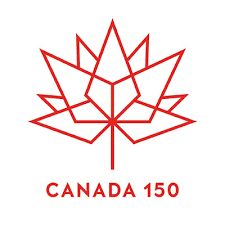 Tuesday, March 7 ~ NATIONAL. Write it, snap, draw it!
Tuesday, March 7 ~ NATIONAL. Write it, snap, draw it!
Are you age 8 to 18 and feeling creative? Try the Canada Day Challenge by submitting a story, essay, poem, photo or drawing in celebration of Canada 150. Deadline Friday March 31, 2017.
Winners will have their work displayed as part of a special summer exhibit at the Canadian Museum of History.
Check it out! http://canada.pch.gc.ca/eng/1449088858795
 Monday, March 6 ~ SQUAMISH – The BC Government is investing $65,000 in the BC Bike Race to help welcome 600 participants from 36 countries to coastal BC for the annual seven-day mountain bike race tour.
Monday, March 6 ~ SQUAMISH – The BC Government is investing $65,000 in the BC Bike Race to help welcome 600 participants from 36 countries to coastal BC for the annual seven-day mountain bike race tour.
MLA for West Vancouver-Sea to Sky Jordan Sturdy (on the right in the photo) made the announcement on behalf of Shirley Bond, Minister of Jobs, Tourism and Skills Training and Minister Responsible for Labour.
“Bringing the world to B.C. with this epic mountain bike race tour is a great way for the global community to Explore B.C. I’m pleased our government is investing in events that will bring more international visitors to the province, including over 600 participants, and generating millions in revenue in communities on Vancouver Island and the South West Coast mainland B.C. over the week-long event,” says Jordan Sturdy, MLA for West Vancouver-Sea to Sky.
The BC Bike Race will run from July 5-13, 2017. It will help bring attention and international visitors to some of BC’s smaller communities – such as Cumberland, Powell River and Sechelt. The event sold out in just one day, has a waiting list in the hundreds, and recently generated $3.4 million of economic activity in BC.
The Tourism Events Program supports events that raise awareness nationally and internationally of BC’s tourism experiences and motivate Canadians and people from other countries to travel and experience British Columbia. These events also generate tourism and economic activity in communities and regions throughout the province.
The BC government says it invests more than $98 million annually in the tourism industry across every region to grow and market the sector.
In 2016, 5.5 million international visitors came to BC — an increase of about 12% compared to 2015. In 2015, the tourism industry generated $15.7 billion in revenue with a direct contribution to B.C.’s gross domestic product of $7.4 billion.
According to the Sports Tourism Economic Assessment Model, the BC Bike Race recently generated $3.4 million of economic activity in BC with $2.3 million in the host communities of the tour.
Monday, March 6 ~ VICTORIA. The 2017 Fallen Firefighters’ Memorial was held today at noon at the BC Legislature. Shirley Bond, Minister of Jobs, Tourism and Skills Training and Minister Responsible for Labour, issued the following statement on the observance of the 2017 Fallen Firefighters’ Memorial:
“Firefighters work tirelessly throughout the province to save lives and protect property for all British Columbians. The job they perform is difficult and dangerous, yet vitally important. Their skills, dedication and courage are touchstones of a profession that deserves our highest commendation,” said Bond in a government news release.
“That is why I was honoured to stand with provincial firefighters and their families today at the Fallen Firefighters’ Memorial to remember all who gave their lives to protect others,” she said. “We paid tribute to 14 firefighters who lost their lives in the line of duty. Their sacrifice is an unimaginable loss for their families, friends and colleagues.”
“On behalf of the Province, we honour the sacrifices of the fallen, and we thank the BC Professional Firefighters Association, and all firefighters in British Columbia who continue to serve, for the work they do to keep our communities safe.”
 Monday, March 6 ~ South Vancouver Island. Well, Saturday March 11 is ramping up to be a politics-of-the-left sorta day on the south island.
Monday, March 6 ~ South Vancouver Island. Well, Saturday March 11 is ramping up to be a politics-of-the-left sorta day on the south island.
- BC NDP Leader John Horgan will be holding his local campaign kickoff, in his home riding of Langford-Juan de Fuca. That’s at the Langford Legion from 10:30am to 12:30pm.
- BC Green Party Leader Andrew Weaver will be holding a BC Green Party rally at the Grand Pacific Hotel in downtown Victoria, from 2 to 4pm.
The official BC provincial election campaign period (i.e. when the Writ drops and the current session of the legislature is dissolved) is expected to start April 11. The election is on Tuesday, May 9 (with plenty of Advance Voting opportunities ahead of that).
Voter registration notices went into the postal mail on February 14, says Elections BC. Registering to vote can be done online at www.elections.bc.ca/ovr or by calling 1-800-661-8683.

BC Education Minister Mike Bernier
Saturday, March 4 ~ VICTORIA. Less than four months after the BC Teachers’ Federation won a landmark victory at the Supreme Court of Canada, a tentative agreement with the employer and government has been reached.
The BC Ministry of Education announced this afternoon, March 4, that representatives of the BC Public School Employers’ Association (BCPSEA), the BC Teachers’ Federation (BCTF), the Public Sector Employers’ Council Secretariat, and the Ministry of Education have reached a tentative Memorandum of Agreement (MoA) negotiated pursuant to Letter of Understanding (LoU) No. 17 to the 2013-2019 BCPSEA-BCTF Provincial Collective Agreement.
On November 10, 2016, the Supreme Court of Canada issued its decision regarding the deletion of certain BCPSEA-BCTF Provincial Collective Agreement provisions by the Education Improvement Act. The Court’s decision restored the deleted provisions, which triggered the negotiation process under LoU No. 17, which states:
“If the final judgment affects the content of the collective agreement by fully or partially restoring the 2002 language, the parties will reopen the collective agreement on this issue and the parties will bargain from the restored language. The Education Fund provisions will continue in effect until there is agreement regarding implementation and/or changes to the restored language.”
The Ministry of Education says: “Given the Court’s restoration of nearly 1,400 clauses across 60 collective agreements, it was important for the parties to determine how to implement the restored language within the context of an education system that had evolved over the past 15 years. The tentative MoA provides clarity related to class size and composition, non-enrolling staff and process language that are now restored.”
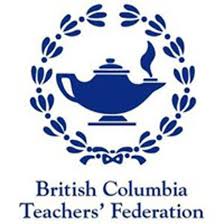 LoU No.17 negotiations began on Nov. 30, 2016 and spanned across 27 bargaining sessions. The BCTF will put the MOA forward for ratification by its members over the coming week. Details of the MOA will be available once the BCTF ratification process is complete.
LoU No.17 negotiations began on Nov. 30, 2016 and spanned across 27 bargaining sessions. The BCTF will put the MOA forward for ratification by its members over the coming week. Details of the MOA will be available once the BCTF ratification process is complete.
“This is great news for students, parents, and teachers,” says Mike Bernier, Minister of Education. “If ratified, the agreement means thousands more teachers, more resources and more classroom supports. If ratified, it will build on the $100 million for up to 1,100 new teachers announced in January’s interim agreement with the BCTF and the record funding increase we just announced in the budget.”
BCTF President Glen Hansman said, “The tentative agreement, if ratified, will allow the next school year to start with thousands more teachers, smaller class sizes, better class composition, and specialist-teacher ratios. BC teachers have been fighting for 15 years to defend our rights and to restore our working conditions. If ratified, this agreement will mean the beginning of a new chapter in public education in BC, one in which teachers will once again have the time to give students the individual care and attention they need and deserve. School libraries and counselling offices will be re-opened, shop and lab classes will have safety standards restored, and all classrooms will be properly supported.”
“The agreement fully restores all of the substantive collective agreement language that was unconstitutionally stripped in 2002 by then-Education Minister Christy Clark,” reports the BCTF.
The tentative agreement is still subject to a province-wide vote of BCTF members, as well as the BC Public School Employers’ Association’s process. BCTF members will vote March 8-10, 2017.
Bernier continued in today’s government news release: “I want to congratulate the parties and thank them for the significant effort and professionalism that was brought to the table. The parties had to deal with some very complex issues, it involved a lot of work, and everyone remained focused on problem-solving. We hope to build on this constructive approach and relationship in the years ahead.”
“Student outcomes have improved dramatically over the past 15 year and are among the best in the world. We already have a world-leading education system,” says Minister Bernier. “With this agreement, we can expect even greater results for our students in the years ahead.”
In the past few years, school boards have credited the commitment of their teachers and parents going the extra mile for helping produce the success of students over the 15 years that the school system has been systematically underfunded. It is unknown how the impact of education under-funding has contributed to family financial strain and also the stark rise in youth stresses including mental health issues.
![Prime Minister Justin Trudeau jogging in Victoria, March 2, 2017 [Canadian Press photo]](https://islandsocialtrends.ca/wp-content/uploads/2016/09/TRUDEAU-JOGGING-IN-VIC-CP-CREDIT-300x169.jpg)
Prime Minister Justin Trudeau jogging in Victoria, March 2, 2017 [Canadian Press photo]
Thursday, March 2 ~ VICTORIA. [Posted at 5 pm]. Prime Minister Justin Trudeau tweeted out at 9:03 am this morning that he had arrived on the West Coast with Defense Minister Harjit Sajjan for a visit to Victoria today, March 2.
Trudeau and Sajjan started off the day with a jog from the Canadian Forces Base Esquimalt near Victoria, along with about 300 military personnel on their monthly timed 5K run. Trudeau reportedly achieved the five-kilometer jog in under 25 minutes.
He toured the HMCS Ottawa and HMCS Chicoutimi including a battle control room, calling those activities “a real treat”. There was a photo op meet-and-greet with military families. The HMCS Ottawa will soon be setting off for a 6-month tour in the Asia Pacific.
After 1 pm, Trudeau met with Victoria Mayor Lisa Helps at Victoria City Hall. Their discussion reportedly included aspects of affordable housing, innovative technology including green tech, and local opposition to the Trans Mountain pipeline expansion, as well the opiate crisis and local infrastructure projects such as Crystal Pool and the Victoria fire hall. There was a large crowd – numbering in the hundreds – comprised of both anti-pipeline protesters as well as well-wishers. There was heavy police security.
Some of the protest signage included messages like “We Vote No” and “You Promised Us Change”. Trudeau said briefing to media that “the environment and economy need to work together”, emphasizing the need for economic growth “while protecting the extraordinary natural inheritance” in BC.
In the Greater Victoria area there are several shops selling marijuana products, ahead of changes to federal legislature that would make pot sales legal. Trudeau answered a media question about marijuana, saying the current law remains in place “until we have a framework to control and regulate marijuana”.
Mayor Lisa Helps said the meeting with Trudeau today was the beginning of a relationship. The last sitting Prime Minister to visit Victoria City Hall was Lester B Pearson in 1965. Trudeau was gifted with a pair of Converse runners, with orca images on one side, as a way to ‘take a walk in our shoes’.
After the brief meeting at Victoria City Hall, Trudeau headed by air to Vancouver to meet with BC Premier Christy Clark at the downtown Fairmont Hotel at 5:30 pm. They are expected to discuss the upcoming BC Election, the fentanyl crisis and softwood lumber issues.
On Friday (March 3), Trudeau will visit Vancouver’s Downtown East Side to get a firsthand look at the drug overdose situation.
Wednesday, March 1 ~ VICTORIA. Prime Minister Justin Trudeau will be in Victoria tomorrow, Thursday, March 2.
Trudeau and Defence Minister Harjit Sajjan will be at Canadian Forces Base in Esquimalt, BC. They will tour the base later in the morning and meet with sailors, and be available to media at 12:30 pm.
Around 1:20 pm Trudeau will meet with Victoria Mayor Lisa Helps at Victoria City Hall.
The Dogwood Initiative group has called an ‘Emergency Town Hall’ to “make sure he hears the voices of real British Columbians”. They will be assembling at Centennial Square outside Victoria City Hall for 12:30 pm. Dogwood members have for several years been protesting any increase in oil tanker traffic off the coast of BC.
Trudeau is scheduled to meet with BC Premier Christy Clark at 5:30pm on Thursday, at the Fairmont Pacific Rim Hotel in downtown Vancouver, to discuss the opioid crisis and softwood lumber. On Friday, Trudeau will take a first-hand look at the drug crisis in Vancouver.
![Brenda Butterworth-Carr, new Deputy Commissioner and Commanding Officer of the RCMP in BC. [Photo from 2015]](https://islandsocialtrends.ca/wp-content/uploads/2016/09/Brenda-ButterworthCarr-2015-headshotcrop-web.jpg)
Brenda Butterworth-Carr, new Deputy Commissioner and Commanding Officer of the RCMP in BC. [Photo from 2015]
Wednesday, March 1 ~ BC. Minister of Public Safety and Solicitor General Mike Morris has announced of the appointment of Brenda Butterworth-Carr as BC’s new Deputy Commissioner and Commanding Officer of the BC RCMP.
“Policing is no ordinary career. It takes courage, determination and perseverance,” says Morris. “Years ago, when I first met Brenda Butterworth-Carr, I was immediately struck by her professional and personal integrity and passion for public safety. I’ve observed her progression over the years as a leader in the RCMP and continue to be impressed.”
Butterworth-Carr is from the Tr’ondek Hwech’in Han Nation Yukon. She joined the RCMP in 1987 as a Native Special Constable. A government release today says Butterworth-Carr’s career “has been diverse and has provided her with a strong understanding of the provincial, municipal and First Nations service agreements,” adding that she also brings a wealth of experience working collaboratively with the many agencies and contract partners that support policing in BC.
In 2015, Butterworth-Carr received The Order of Merit of the Police Forces, awarded by Governor General David Johnston.
Deputy Commissioner Craig J. Callens leaves the post after 32 years of RCMP service.

Brendan Ralfs, BC Green Party Candidate in Langford-Juan de Fuca
Wednesday, March 1 ~ West side of Vancouver Island. The BC Green Party has announced their candidate for Langford-Juan de Fuca. Brendan Ralfs — a provincial emergency manager on southern Vancouver Island — will be running on the same ballot as BC NDP Leader John Horgan and BC Liberal candidate Cathy Noel.
“After spending 20 years as a forest firefighter in BC I am passionate about seeing our province protected for future generations,” Ralfs said today in BC Greens news release. Ralfs has helped communities respond to a broad array of weather-influenced emergencies, including floods, storms and drought.
“I am honoured to welcome Brendan to our team. His experience managing emergencies across the province means he has a firsthand understanding of the impacts of climate change,” says BC Green Party Leader Andrew Weaver.
Ralfs calls Weaver a “clear choice to lead us in working together to ensure our home is a place where social justice prevails, the natural environment is protected and everyone has the opportunity to pursue their dreams while leading safe, productive lives”.


![Federal Finance Minister Bill Morneau delivers his second budget [live stream March 22, 2017]](https://islandsocialtrends.ca/wp-content/uploads/2016/09/MORNEAU2-FederalBudget-Mar2217-web-300x170.jpg)
![Historical photo when trains were running on the E&N [Photo: John Luton]](https://islandsocialtrends.ca/wp-content/uploads/2016/09/EN-Traintraffic-JLutonPhoto-300x225.jpg)
![BC Minister of Transportation & Infrastructure Todd Stone {Government photo]](https://islandsocialtrends.ca/wp-content/uploads/2016/09/Stone-Todd.jpg)
![Langford Mayor Stew Young [Photo: West Shore Voice News]](https://islandsocialtrends.ca/wp-content/uploads/2016/09/LANGFORDMAYOR-YOUNG-WestShoreVOICE-2016-web-222x300.jpg)

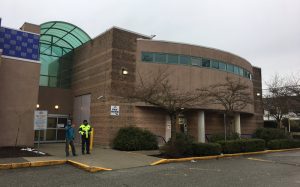
![Firefighters Memorial at the BC Parliament Buildings, March 6, 2017 [BC Government Photo]](https://islandsocialtrends.ca/wp-content/uploads/2016/09/FFMEmorial-Mar0617-BCGOVT-web-300x240.jpg)
![Prime Minister Justin Trudeau and Defence Minister Harjit Sajjan [Photo taken in Poland, July 2016]](https://islandsocialtrends.ca/wp-content/uploads/2016/09/cda-nato-poland-20160708.jpg)